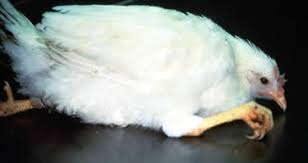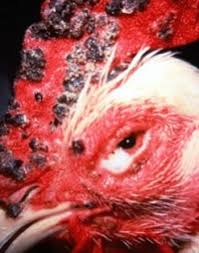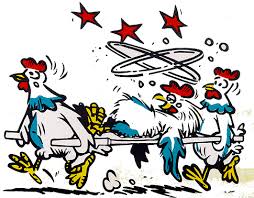The keeping of backyard poultry gives great enjoyment to
many people. The production of fresh eggs and meat for human consumption, plus
the enjoyment they give as pets or show birds, makes poultry valuable members
of many families.
Poultry may become ill from many causes. There are a few
major categories of diseases that commonly occur in small poultry flocks.
External parasites
 Poultry can carry a large variety of parasites on their
bodies. They should be examined regularly, and treated for external parasites
every two to three months. Poultry can carry a large variety of parasites on their
bodies. They should be examined regularly, and treated for external parasites
every two to three months.
These parasites range in size from large, blood sucking
ticks up to 1 cm in size, down to the microscopic scaly face mite that is less
than 0.5 mm in size. Other external parasites that are commonly encountered are
the flea and lice.
External parasites generally cause mild clinical signs such
as feather damage, anaemia and irritation.
Internal parasites
Backyard poultry also carry a wide range of internal
parasites. Internal parasites attack the lining of the intestine, and absorb
nutrients from the bird’s gut for maintenance of its own body and multiply for production
of eggs.
Clinical signs of internal parasitism may include weight
loss, pale combs or diarrhea.
Large round worms can be visible with the naked eye. They are transmitted by the ingestion of eggs
from the faces of infected birds. Regular removal and cleaning of faces from
the bird's enclosure will result in less worm eggs in the environment, and less
chance of worms spreading from bird to bird.
Intracelluler parasites can only visible under a microscope
- Eimeria and Giardia
Marek's disease
Marek's disease is a viral infection that only affects
poultry. The virus is spread from bird to bird in feather dander and dust. It
lives in the environment for long periods, and can spread between properties on
people's clothes and on shared equipment. Birds are usually infected at a young
age, but may not show signs of disease until some months later.
 The virus that causes Marek's disease attacks the white
blood cells of the bird, and results in cancer. These cancers most commonly
affect the nerves and cause paralysis. Usually, the legs are affected, but the tumors
may also affect the nerves in the wings and neck. The virus that causes Marek's disease attacks the white
blood cells of the bird, and results in cancer. These cancers most commonly
affect the nerves and cause paralysis. Usually, the legs are affected, but the tumors
may also affect the nerves in the wings and neck.
Birds may also develop tumors in the body. As they grow,
these tumors may cause a number of signs including weight loss, diarrhea, ill
thrift, and difficulty breathing.
A vaccine should be given to birds at one day of age. It is
recommended that all birds be vaccinated, even though the vaccine is not as
effective as it used to be. This is due to the virus that causes the disease
mutating slightly over time. Most large hatcheries vaccinate their chicks, so
birds purchased from them should be protected, and vaccine is available at a
reasonable cost for birds hatched privately.
Leucosis
 Avian leucosis is also a viral disease affecting chickens which
causes tumors or cancers. These tumors occur in older birds than those affected
by Marek's disease, usually more than 6 months old. It causes listlessness and
loss of weight and the bird eventually dies. Avian leucosis is also a viral disease affecting chickens which
causes tumors or cancers. These tumors occur in older birds than those affected
by Marek's disease, usually more than 6 months old. It causes listlessness and
loss of weight and the bird eventually dies.
The viruses affect the white cells and tumors usually
appear in the liver and spleen but also in other sites. Sometimes the tumor
appears as white lumps, at other times the liver and spleen appear larger than
normal. The viruses are transmitted through the egg and commercial producers
attempt to eliminate it from their strains of birds. There is very little that
a poultry owner can do except keep the bird comfortable and destroy it when
life becomes unpleasant for it.
Respiratory disease
 There are many causes of respiratory disease in poultry.
Respiratory signs such as coughing, sneezing and discharge from the eyes and
nostrils can be caused by parasites (gapeworm - Syngamus trachea), dust, high
ammonia levels, or a variety of bacteria or viruses. There are many causes of respiratory disease in poultry.
Respiratory signs such as coughing, sneezing and discharge from the eyes and
nostrils can be caused by parasites (gapeworm - Syngamus trachea), dust, high
ammonia levels, or a variety of bacteria or viruses.
In all cases, a veterinarian with experience in poultry
disease must diagnose the exact cause, particularly if mortalities occur. Some
of the respiratory viruses such as Infectious Laryngotracheitis Virus (ILT),
Newcastle Disease and Avian Influenza are notifiable or exotic diseases, and must
be reported to a Government Veterinarian if they are suspected. Treatment will
depend on the cause of the respiratory signs. For some viral causes such as
ILT, vaccination is recommended.
Fowl pox
 Another viral infection of birds is fowl pox. This disease
is spread by biting insects and sometimes by fighting. The virus enters the
body through a scratch or scrape, and raised scabs form on the scratch and
surrounding areas. Scabs can also form in the mouth and throat. Most cases
improve without treatment, although some birds become ill from secondary
infection. Birds that recover are immune for life. Another viral infection of birds is fowl pox. This disease
is spread by biting insects and sometimes by fighting. The virus enters the
body through a scratch or scrape, and raised scabs form on the scratch and
surrounding areas. Scabs can also form in the mouth and throat. Most cases
improve without treatment, although some birds become ill from secondary
infection. Birds that recover are immune for life.
Prevention is only by vaccination, this may need to be done
every few years to give complete protection.
Nutritional deficiencies
Many small flocks of birds are fed only table scraps. This
diet is not sufficient to meet the nutritional demands of growing birds or
layers. Common deficiencies include calcium (resulting in poor bone growth and
rickets), energy (poor growth, weight loss, poor egg production), and vitamin A
(poor skin and feathering). Formulated diets are available for all stages of a
hen's life, (starter, grower and layer) and these should be fed in conjunction
with table scraps, fruit and vegetables to form a balanced diet.
Reproductive problems
Commercial birds are bred to lay for only one, or two
laying seasons. If they are then sold to backyard producers for extended
laying, they are prone to reproductive problems. This includes egg binding
(where the egg is unable to be passed out of the bird), metritis (inflammation
of the oviduct and shell gland), and yolk peritonitis (free yolk in the
abdominal cavity, leading to infection).
Affected birds stop laying eggs, are depressed, stop eating
and eventually die. They often develop a swollen abdomen, and may have
respiratory difficulties. Surgery by a veterinarian is possible to resolve
these conditions, however, the surgery results in the bird being unable to lay
eggs. Hence, it is reserved only for pet birds.
Exotic disease
 Newcastle Disease and Avian Influenza are the major exotic
diseases small poultry keepers need to be aware of. Newcastle Disease and Avian Influenza are the major exotic
diseases small poultry keepers need to be aware of.
Signs of Newcastle Disease range from mild respiratory signs
to very severe depression drop in egg production, diarrhoea, collapse and
nervous system signs. Death rates can be up to 100%.
Avian Influenza often appears suddenly, and birds die
quickly. Diarrhoea, depression, decreased egg production, swollen and discolored
wattles and respiratory signs may all be observed.
You can prevent your birds becoming infected with these
diseases by limiting their exposure to migrating waterfowl and wild birds that
can carry these viruses. Preventing overseas visitors who may be inadvertently
carrying the virus, from accessing your birds and refusing to accept birds or
eggs that may have been imported will also decrease the chances of your birds
becoming infected.
|
No comments:
Post a Comment